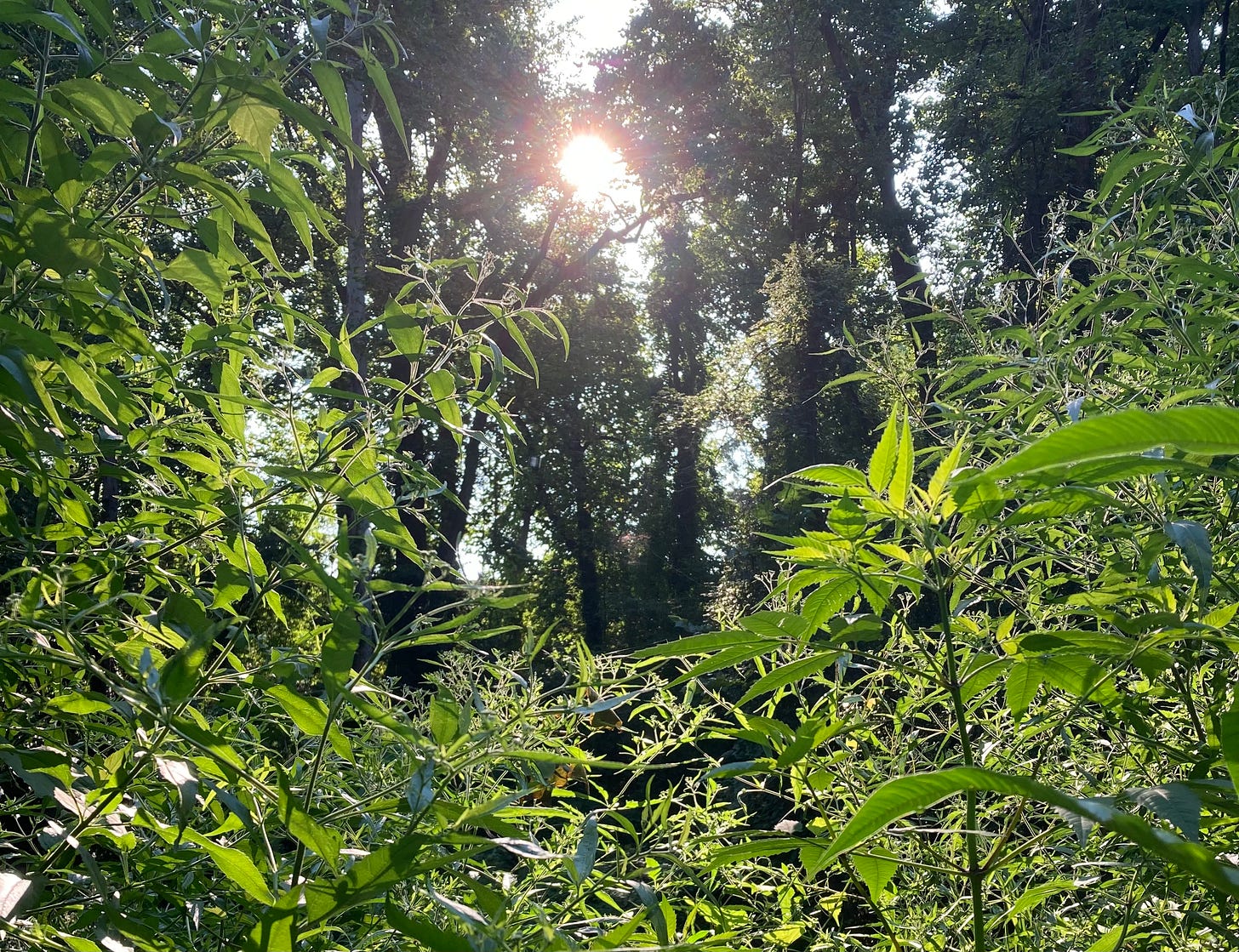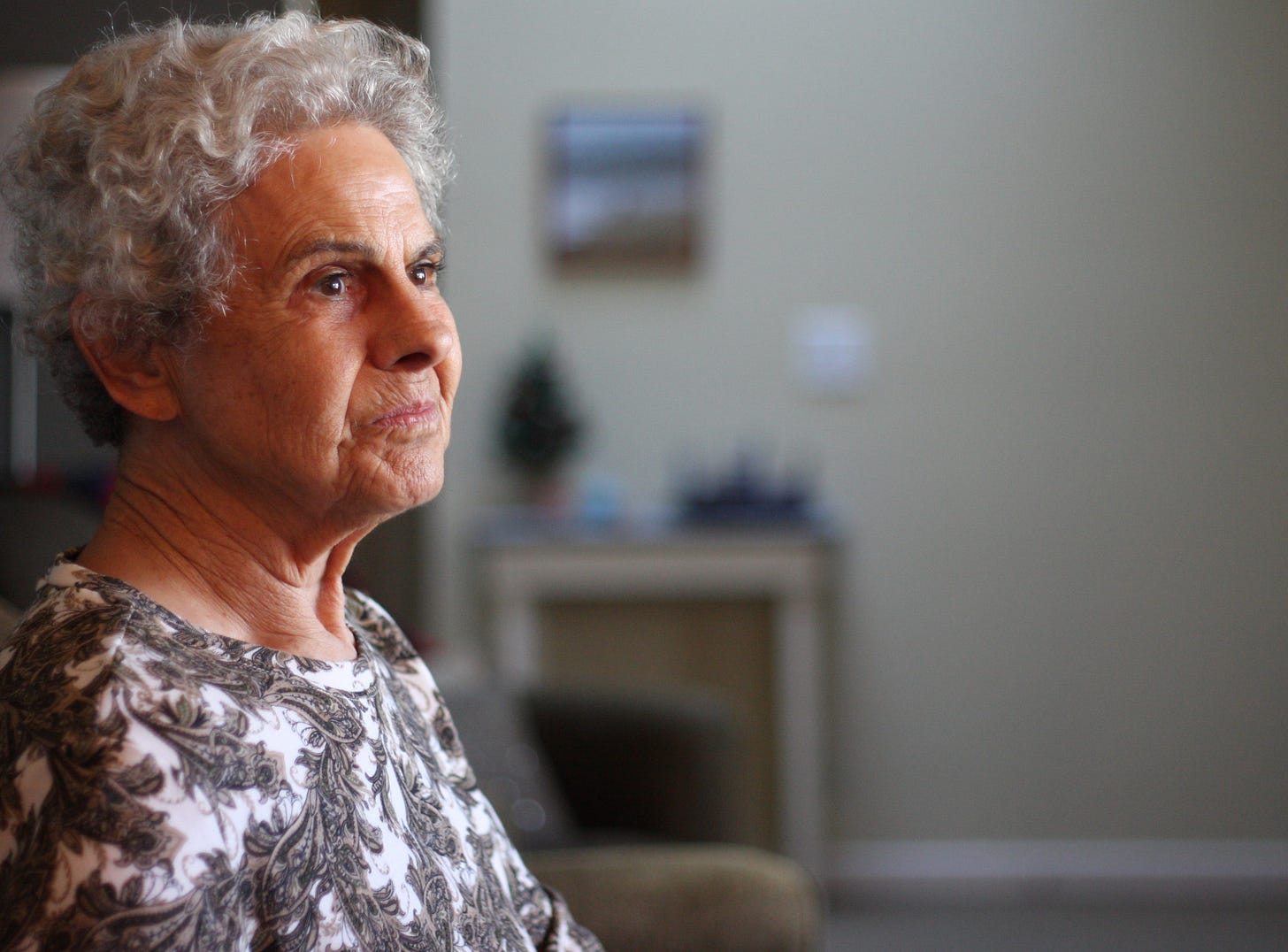grief is nonbinary
trying to say what maybe can only be felt
Earlier this month I woke up and just could not — so much so that I was tearfully irritated at the birds taking dust baths in the early morning road as my partner and I headed to the garden plot, because I didn’t want to run them over and just couldn’t handle tracking all of the tiny bodies. My body was aching in a way it hasn’t in a while, and I felt a deep kind of sadness and grumpiness at every single stimulus. I spent a confusing hour scrolling on my phone, stretching, talking to a beloved until the pain was too insistent and I had to hang up. And then, as my partner and I walked down by the creek, I remembered the day — August 3rd, the day my grandmother died 4 years ago.
I’ve written a lot about my maternal grandmother — Margorie Downing Boehle Irwin, Grandma Margie to me and my brother — over the past ten years. She was and did many things over her long life: she was a mother, a nurse, a divorcee in an era before divorce was common for middle class white people, a sister, a grandmother, a gardener. She loved the ocean, and laughing. She was playful in a sly way, practical and skilled at many things. For the last ten+ years of her life, she had a long experience of dementia, something that no matter how much or little time you spend with someone, is a deeply vulnerable and intimate experience/expression of what’s going on in and with their brain. She lived at home with her husband until the last month before she died, and I got to spend the last week and hours of her life with her at her bedside.
In these years since she has died, I have learned so much more about her and her life — that she wanted to get a PhD after she got her master’s in nursing, but was worried that it would make her too different from her colleagues, that she made her second husband read several relationship books with her before she’d even consider getting married to him. And I have remembered/uncovered so much — I see her in the ways I feel happy deep cleaning the little apartment I live in, the desire for organization, my love of a cotton kitchen towel, the “unsuitable” (read: unexpected) people I fall in love with, the art I make with my hands and the crisp sheets on the bed, the ways I wear my clothes, which is another way of wondering and noticing our in many ways similar sense of gender.
I miss her. There is and isn’t much I want to ask her. I want to hear her tell all her stories over again. But I also wish our bodies could just be near each other again, and that we could make each other laugh, in the ways we could even in the years when she wasn’t saying much anymore besides “oh, look at that,” or “it’s so…nice,” or “that man,” as she called my grandpa by then, in exasperation and love and affection. We’d lock eyes and laugh and laugh — at the absurdity of trying to communicate, the joy of getting to be together, the strangeness of knowing that we loved each other even when we weren’t entirely sure who the other one was. Every iteration and age of her was a gift to everyone around her.
In some ways, writing about grief is a funny thing — people in the US love to say that we don’t talk much about grief in our culture. But maybe what we mean is that we long to experience the fullness of our grief, to have it held. Because grief, the experience of it, is something that slips between and around language. Like so much of the world, it’s something that is beyond or before any words we might have for it. And when we have an experience like that, I think we become hungry for a space — rituals or ceremonies or writing — to hold what can’t be said but only felt.
And there is so much to grieve — the forced warming and climate transformation of the planet, the ways that the systems of harm we live under are destroying the psyches and bodies of people and beings and places we love, including ourselves. An ongoing pandemic within which so many of us don’t have enough time to slow down and grieve or process how our lives have changed and are changing. Loss upon loss upon loss. And woven in among all of this, and influenced and touched by all of it, is the very human experience of people we love aging, getting ill, and dying.
I once went to a talk with Cindy Milstein, as part of her rebellious mourning book tour, about public expressions of collective and community-level grief, and I remember her sharing that the effects of systems like capitalism and colonialism add on a layer of grief to death and dying — that we grieve not only the deaths of people we love but also the ways that systems impact how and why people die. In a world without these systems, there was and will still be death, and loss, and pain, and all of the very human things that come with being here, but we don’t have to hold the complex feelings of rage and sadness and overwhelm that can often tag along with death these days.
In many ways the grief I have for my grandmother, because of our experience as middle class white people in the US, doesn’t have systemic sadness attached — she lived for a long time, she was loving and deeply loved — and the pieces that do, like the fact that she and my grandpa didn’t have enough money for her to have long-term care insurance, which meant an incredible amount of work and stress on my grandpa in the last years of her life, and her dementia, which feels like the kind of thing we can understand as both a thing that just happens to bodies sometimes and may somehow be caused by some aspect of late capitalism, aren’t as sharp for me.
It feels impossible to draw a line around her life, her death, and divide things neatly, sorting the good from the bad. She was able to stay at home because her husband devoted his life to caring for her, which both wrung him out and simultaneously gave him a level of purpose and connection that I think he was grateful for, and was certainly skilled at. His care transformed so many narratives in our family about the kind of person he was, and I think allowed people to see him in ways they hadn’t before.
I used to want the theory of things that would make everything clear and explain it all, would let me sort what was true from what wasn’t; and while parts of me still long for that kind of clarity, there is something about the stickiness of grief that has made me want to collect and collect and collect, without making any clear categories of true and false. Is death bad or good? Is it true that we grieve more these days? Or less? Are we avoidant of grief, or fetishizing of it? But/and beyond all these questions that seek to simplify in a particular way, there is the reality of grief, in which all of it is true, all at once, and also none of it is, because it’s something else entirely.
At my grandmother’s side as she was dying, I realized two things: first, I think in our last moments together we want the same thing we want after we are born and throughout our lives: someone to be there, to put their hands on our head or on our arm, to tell us that they’re here. Second, that our bodies know how to die. This is a weird and potentially triggering statement, but I found it profoundly comforting as we sat in vigil as my grandma did the work of dying. I had always thought of death as some kind of horrible undoing of all of the things that keep us alive - something painful and difficult, something unimaginable. And yet, I’ve continued to learn in the years since, that death in many ways, does look like work, a different kind of work that our bodies do than the work of keeping ourselves alive. Is this a true statement? I don’t know. Is it true of all deaths? Most certainly not. But it’s one that this particular grief and death have brought to me, and so I tend to it.
I have found, in these weeks of returning to this email, reading my words over, that grief comes both so easily now, and with so much difficulty. Maybe what that adds up to is that grief is part of my internal landscape for good. A place I didn’t know about before, but that is as familiar to me as any trail in the woods nearby.
I remember, in the weeks after my grandma died, when my lungs felt like I was trying to breathe saltwater, when I had no logical reason for why I felt so transformed by this experience, when I was so slow, and so irritated, I thought: I used this word grief before but I had no idea what it meant. I hadn’t known, before, the insistence of grief, the way it is bodily, and not in my mind. An experience I have no control over, that comes and goes in particular times and places, but also without warning or expectation, that is both elusive and so, so practical: hard to pin down and also needing things, like soup, or tea, or a long session of sobbing. I find myself, even now, struggling to say much that feels true about grief — the words pile up, but none of them are quite right. I wish we could be in the same room together, and I could put your hand over my heart, or that we could hold each other. Grief is like that, I might say, and you might feel how it is.
Thanks for being here. Sending you so much care from the creeks,
Kali





